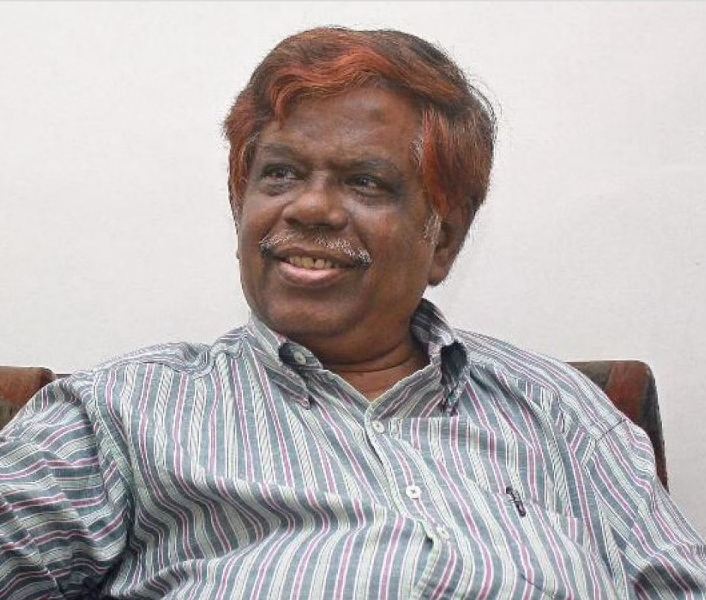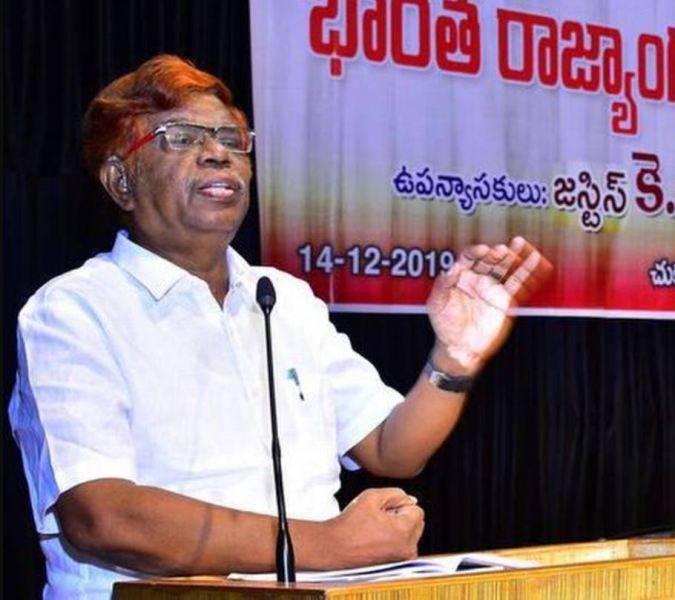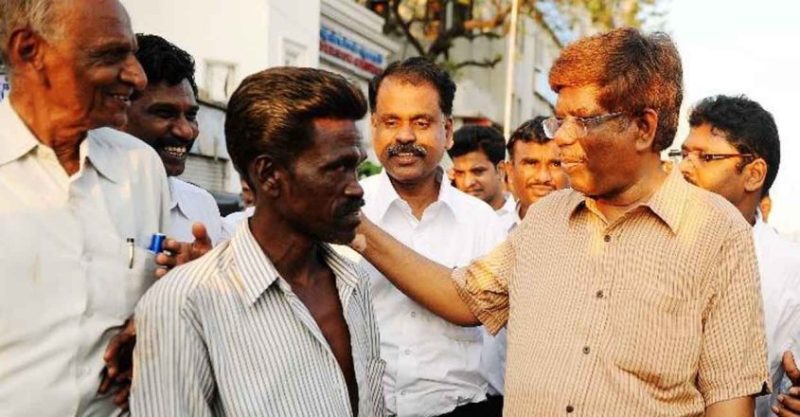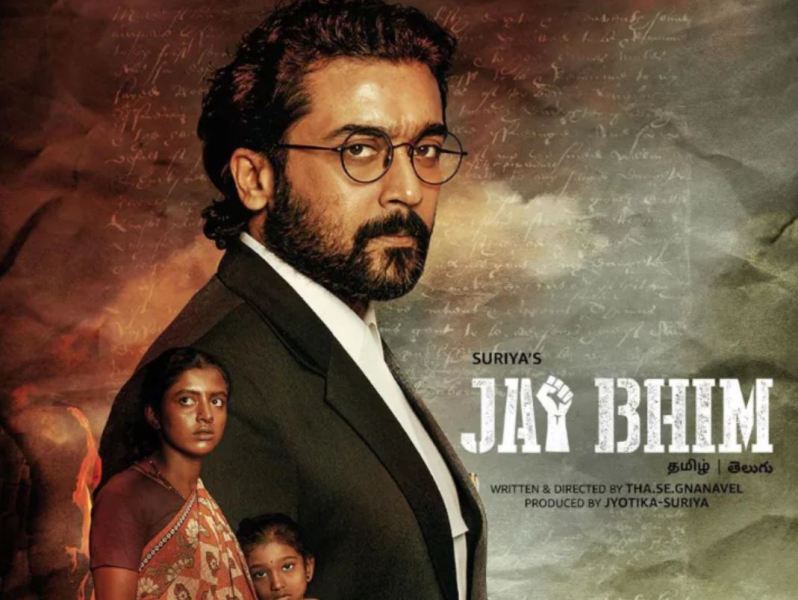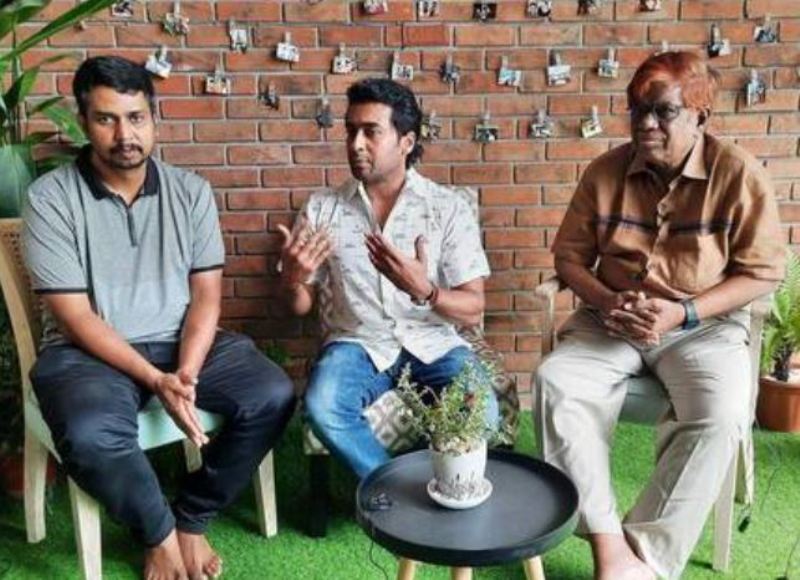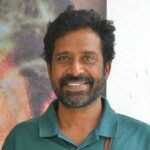K. Chandru Age, Caste, Wife, Children, Family, Biography & More
| Bio/Wiki | |
|---|---|
| Full Name | Krishnaswami Chandru [1]Deccan Herald |
| Profession | Former Madras High Court Judge |
| Famous For | Being a lawyer who fought a case based on caste discrimination in Indian state Tamil Nadu in 1993 on which a Tamil film titled Jai Bhim was picturised in 2021 |
| Physical Stats & More | |
| Height (approx.) | in centimeters- 167 cm in meters- 1.67 m in feet & inches- 5’ 6” |
| Eye Colour | Black |
| Hair Colour | Grey (Dyed with Henna) |
| Personal Life | |
| Date of Birth | 8 May 1951 (Tuesday) |
| Age (as of 2021) | 70 Years |
| Birthplace | Srirangam ,Tamil Nadu |
| Zodiac sign | Taurus |
| Nationality | Indian |
| Hometown | Srirangam ,Tamil Nadu |
| College/University | • Loyola College, Chennai • Madras Christian College |
| Educational Qualification(s) [2]Bar and Bench | • Undergraduation from Loyola College, Chennai • Law Degree in 1973 |
| Relationships & More | |
| Marital Status | Married |
| Marriage Date | Year, 1990 |
| Family | |
| Wife | Name Not Known (College Lecturer) |
| Children | He has one daughter. |
Some Lesser Known Facts About K. Chandru
- Justice K. Chandru is a retired Indian judge from Madras High Court, Tamil Nadu. He was appointed as a judge by Dr APJ Abdul Kalam in Madras High Court in 2009. During his incumbency, K. Chandru cleared 96000 cases as a judge in six and a half years. He is popular for a Tamil case that he fought during his practice as a lawyer in 1993. The Tamil movie Jai Bhim, released in 2021, was based on the true story of a legal battle that Chandru fought in 1993.
- During his college days at Loyola College, K. Chandru joined the Communist Party of India (Marxist) as its student activist. During that time, he represented a student commission that was formed during the Commission inquiry started by DMK Chief M. Karunanidhi after the death of a student from Anna University after a severe lathi charge by the police. K. Chandru was then pursuing his second year and was rusticated for influencing student agitations. To complete his undergraduate course, he joined Madras Christian College in his third year. Soon after completing his graduation, K. Chandru joined CPI(M) as a full-time party worker, and he was also involved in community services till 1988. In 1973, K. Chandru started studying law. During his law studies, he was not provided with hostel accommodation as he was a student leader. Later, K. Chandru sat for an indefinite fast before the college authorities, and ultimately, got the seat.
- K. Chandru worked as a lawyer for eight years for a law venture named Row & Reddy. During his practising tenure, he opposed the Indian Constitution amended during the emergency (1975-1977) in India in which several communities felt deprived of their basic constitutional rights. He also attended one of the meetings based on the amendment of the constitution during the time of emergency in India. In a conversation with a media house, K. Chandru said that he told in the meeting that such a Constitution must be thrown in the Bay of Bengal. [3]Bar and Bench K. Chandru said,
In fact in one of the meetings, as a first year student I said that this Constitution must go and be thrown into the Bay of Bengal. I also quoted a Chattist song that went,
“Hurrah for the masses, lawyers are asses
The judges are going to jail.
The laws are illegal, the commons are regal
The judges are going to jail.”
- According to K. Chandru, he travelled through lorries and buses all across Tamil Nadu for two years during his tenure at Row & Reddy. To enhance his legal skills, K. Chandru observed the different lifestyles, speech patterns, and cast system of the local society during his travels. He ate whatever was available to him and slept in the houses of Dalit labourers, trade union leaders, and poor farmers. K. Chandru considers these years the most productive years of his life.
- After leaving the legal firm Row & Reddy, K. Chandru decided to join the bar association politics of Tamil Nadu. Soon, he was elected as the Executive Member of the Advocates Association in Tamil Nadu. K. Chandru was the youngest lawyer who was chosen as a Member of the Bar Council of Tamil Nadu. During the same time, there were severe lawyer-police clashes in the state that led to the strikes in Madras High Court. K. Chandru also participated in those strikes as a leader.
- In 1988, he opposed the interference of Rajiv Gandhi in Sri Lanka. K. Chandru was expelled from the CPI (M) party when he stated that Rajiv Gandhi had no right to break the deal with Jayawardana. However, the CPI (M) party stood in favour of Rajiv Gandhi. Soon after leaving CPI(M), he resigned as the party lawyer and trade union lawyer.
- In 1990, K. Chandru was promoted as a Senior Advocate by the High Court of Tamil Nadu.
- Justice K. Chandru practised law at the Madras High Court both in criminal and civil fields. In July 2006, he was appointed as an Additional Judge of Madras High Court. On 9 November 2009, K. Chandru was promoted as the permanent judge of the court.
- Justice K. Chandru is known for providing justice to several impoverished and downtrodden people in Tamil Nadu as a judge at the Madras High Court (from 2006 to 2014). K. Chandru is also known for his fight against caste discrimination and the rights of the backward communities in Tamil Nadu.
- One of his popular judgements includes the case of September 2008, when Justice K. Chandru allowed a woman to perform the rituals and ceremonies inside a temple instead of a male cousin of this woman who claimed himself to be the authorised person to conduct the Hindu rituals in that temple. While giving logic in his judgement, K. Chandru stated in his judgement that how could we debar a woman to enter a temple premises when the idol in the temple is of a Goddess. He stated,
It is ironic that when the presiding deity of the temple is a Goddess, objections are being raised against a woman in performing poojas in such temples…Neither provision of law nor any scheme prohibits women from performing poojas in the said temple.”
- During his tenure as a lawyer and judge, he denied a personal bodyguard offered by the Tamil Nadu government. As a judge, he ordered his lawyers not to address him as ‘My Lord.’ On 8 March 2013, K. Chandru retired as a judge from Madras High Court and did not accept a farewell from his colleagues.
- During his tenure as a senior counsel in Madras High Court, K. Chandru extensively worked on labour, service, education, and human rights issues. K. Chandru advocated for various renowned Indian universities such as the University Grants Commission (UGC) in several cases.
- K. Chandru believes in Marxist ideology. In one of his interviews, he stated that Marxism helped him understand B. R. Ambedkar in a better way. He stated,
My Marxist background helped me understand Ambedkar better.”
- K. Chandru has published several books and columns on law, and one of his literary works was published in 2021. A book titled ‘Chandru, Justice K. (2021). Listen to My Case!: When Women Approach the Courts of Tamil Nadu’ was released by him in 2021. In this book, K. Chandru narrated the stories of twenty women and their inspiring stories to fight for justice.
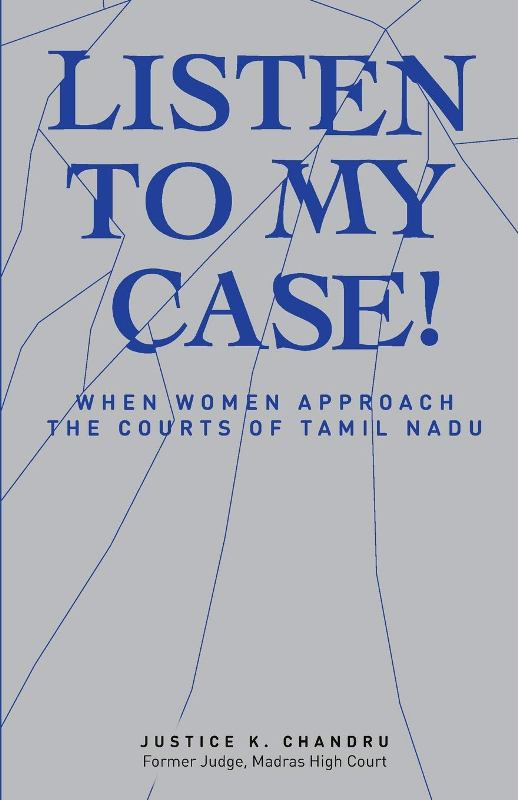
- In 2021, a Tamil film titled Jai Bhim was picturised on a case that was handled by Justice K. Chandru in 1993 in 1993, the case of Rajakannu-Parvati that involved the custodial death of Rajakannu. K. Chandru was involved in narrating the script of the movie from pre-discussion to post-production of the film. The film was directed by T. J. Gnanavel and produced by Jyotika and Suriya. It is a legal drama movie based on the true events of a case fought in 1993 in which a woman named Parvati who belonged to the Irula tribal community sought justice for his husband who was captured by the police on false charges of theft, and when he went missing from the jail, the police claimed that her husband fled from the jail. With the help of the lawyer K. Chandru, Parvati filed a petition in Madras High Court to seek justice. The case took 13 years to announce its verdict, and at the end of the case, the accused police officers were granted 14 years of imprisonment for the custodial murder of Rajakannu.
- In a conversation with a media house, K. Chandru was asked his personal experience after watching the movie Jai Bhim based on his justice pursuits. He then replied,
The first time I saw the film, I was watching like anyone else. Soon, in many of the scenes depicting the lawyer, I recognised some of my mannerisms and noticed actions and dialogues which I might have used earlier. The scenes kept reminding me of my life 30 years ago.”
- On his first day as a lawyer, K. Chandru officially declared his assets and belongings and mentioned his net worth on the last day as a judge in Madras High Court. After his retirement, he went to his home on a local train as he surrendered his official car to the court.
- In a conversation with a media house, he was asked that how did he dispose of 96000 cases in six and a half years as a judge, and what strategy was adopted by him. K. Chandru then replied that he used to increase his court working hours. He answered,
I used to go to court 15 minutes before and leave the court one hour after court proceedings were over. I tried to increase the court hours. Further, in admission matters I did not hear lawyers unless I wanted to dismiss the matter. I would read the briefs and if it is a matter that needs to be admitted, than I need not hear the lawyer.
References/Sources:

